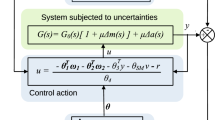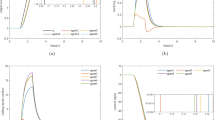Abstract
This paper concerns the issue of sliding mode control (SMC) for phase-type stochastic nonlinear semi-Markov jump systems (S-MJSs) via the T-S fuzzy strategy. One unrealistic assumption, that is, the sojourn time in stochastic switching systems follows an exponential distribution, is removed in this paper by S-MJSs model, which is one of the main features compared to the existing literatures. First, by using the plant transformation method and the supplementary variable technique, phase-type S-MJSs are equivalent to associated Markov jump systems (MJSs). Then, an integral sliding surface function is established to cope with the influence of the switching phenomenon in the plant. By using Lyapunov functions and inequality optimization problems, sufficient conditions are provided for stochastic stability of the system with a prescribed \(H_\infty \) performance index. In addition, a fuzzy SMC law is synthesized to guarantee that the associated T-S fuzzy MJSs fulfill the reaching condition in bounded time. Finally, the validity of the conclusions is verified by the single-link robot arm model.





Similar content being viewed by others
Data availability
The datasets generated during and/or analyzed during the current study are available from the corresponding author on reasonable request.
References
Dong, G.W., Li, H.Y., Ma, H., Lu, R.Q.: Finite-time consensus tracking neural network FTC of multi-agent systems. IEEE Trans. Neural Netw. Learn. Syst. 32(2), 653–662 (2020)
Li, H.Y., Wu, Y., Chen, M.: Adaptive fault-tolerant tracking control for discrete-time multi-agent systems via reinforcement learning algorithm. IEEE Trans. Cybern. 51(3), 1–12 (2020)
Lin, G.H., Li, H.Y., Ma, H., Yao, D.Y., Lu, R.Q.: Human-in-the-loop consensus control for nonlinear multi-agent systems with actuator faults. IEEE CAA J. Autom. Sinica (2020). https://doi.org/10.1109/JAS.2020.1003596
Dong, S.L., Wu, Z.G., Su, H.Y., Shi, P., Karimi, H.R.: Asynchronous control of continuous-time nonlinear Markov jump systems subject to strict dissipativity. IEEE Trans. Autom. Control 64(3), 1250–1256 (2019)
Yao, D.Y., Lu, R.Q., Ren, H.R., Zhou, Q.: Sliding mode control for state-delayed Markov jump systems with partly unknown transition probabilities. Nonlinear Dyn. 91(1), 475–486 (2018)
Yu, P., Ma, Y.C.: Observer-based asynchronous control for Markov jump systems. Appl. Math. Comput. 377, 125184 (2020)
Zhao, Y.H., Ma, Y.C.: Asynchronous \(H_{\infty }\) control for hidden singular Markov jump systems with incomplete transition probabilities via state decomposition approach. Appl. Math. Comput. 407, 126304 (2021)
Boukas, E.K.: Stochastic switching systems: Analysis and design. Birkh\(\ddot{a}\)user: Boston (2006)
Wu, H.N., Cai, K.Y.: Mode-independent robust stabilization for uncertain Markovian jump nonlinear systems via fuzzy control. IEEE Trans. Syst. Man. Cybern. B Cybern. 36(3), 509–519 (2005)
Zong, G.D., Li, Y.K., Sun, H.B.: Composite anti-disturbance resilient control for Markovian jump nonlinear systems with general uncertain transition rate. Sci. China Inform. Sci. 62(2), 022205 (2019)
Hou, Z.T., Luo, J.W., Shi, P., Nguang, S.K.: Stochastic stability of It\(\hat{o}\) differential equations with semi-Markovian jump parameters. IEEE Trans. Autom. Control 51(8), 1383–1387 (2006)
Li, M., Chen, Y., Xu, L.Y., Chen, Z.Y.: Asynchronous control strategy for semi-Markov switched system and its application. Inform. Sci. 532, 125–138 (2020)
Ning, Z.P., Zhang, L.X., Colaneri, P.: Semi-Markov jump linear systems with incomplete sojourn and transition information: Analysis and synthesis. IEEE Trans. Autom. Control 65(1), 159–174 (2020)
Tian, Y.X., Yan, H.C., Zhang, H., Zhan, X.S., Peng, Y.: Dynamic output-feedback control of linear semi-Markov jump systems with incomplete semi-Markov kernel. Automatica 117, 108997 (2020)
Wang, B., Zhu, Q.X.: Stability analysis of semi-Markov switched stochastic systems. Automatica 94(94), 72–80 (2018)
Zhang, L.X., Cai, B., Shi, Y.: Stabilization of hidden semi-Markov jump systems: emission probability approach. Automatica 101, 87–95 (2019)
Jiang, B.P., Karimi, H.R., Kao, Y.G., Gao, C.C.: Takagi-Sugeno model based event-triggered fuzzy sliding mode control of networked control systems with semi-Markovian switchings. IEEE Trans. Fuzzy Syst. 28(4), 673–683 (2020)
Qi, W.H., Zong, G.D., Karimi, H.R.: SMC for nonlinear stochastic switching systems with quantization. IEEE Trans. Circuits Syst. II Express Briefs (2020). https://doi.org/10.1109/TCSII.2020.3047785
Qi, W.H., Zong, G.D., Zheng, W.X.: Adaptive event-triggered SMC for stochastic switching systems with semi-Markov process and application to boost converter circuit model. IEEE Trans. Circuits Syst. I Reg. Papers 68(2), 786–796 (2021)
Wang, J., Chen, M.S., Shen, H.: Event-triggered dissipative filtering for networked semi-Markov jump systems and its applications in a mass-spring system model. Nonlinear Dyn. 87(4), 2741–2753 (2017)
Shen, H., Men, Y.Z., Wu, Z.G., Cao, J.D., Lu, G.P.: Network-based quantized control for fuzzy singularly perturbed semi-Markov jump systems and its application. IEEE Trans. Circuits Syst. I Reg. Papers 66(3), 1130–1140 (2019)
Dong, S.L., Chen, G.R., Liu, M.Q., Wu, Z.G.: Robust adaptive \(H_{\infty }\) control for networked uncertain semi-Markov jump nonlinear systems with input quantization. Sci. China Inform. Sci. 65, 189201 (2022)
Neuts, M.F.: Probability distributions of phase type. University of Louvain, Belgium (1975)
Heffes, H., Lucantoni, D.: A Markov modulated characterization of packetized voice and data traffic and related statistical multiplexer performance. IEEE J. Sel. Area. Comm. 4(6), 856–868 (1986)
Takagi, T., Sugeno, M.: Fuzzy identification of systems and its applications to modeling and control. IEEE Trans. Syst. Man. Cybern. SMC–15(1), 116–132 (1985)
Yao, Y.G., Tan, J.Q., Wu, J., Zhang, X.: Event-triggered fixed-time adaptive fuzzy control for state-constrained stochastic nonlinear systems without feasibility conditions. Nonlinear Dyn. 105(1), 403–416 (2021)
Mu, Y.F., Zhang, H.G., Su, H.G., Ren, H.: Unknown input observer synthesis for discrete-time T-S fuzzy singular systems with application to actuator fault estimation. Nonlinear Dyn. 100(4), 3399–3412 (2020)
Chen, L.H., Zhu, Y.Z., Ahn, C.K.: Novel quantized fuzzy adaptive design for nonlinear systems with sliding mode technique. Nonlinear Dyn. 96(2), 1635–1648 (2019)
Zhang, X.F., Huang, W.K.: Robust \(H_{\infty }\) adaptive output feedback sliding mode control for interval type-2 fuzzy fractional-order systems with actuator faults. Nonlinear Dyn. 104(1), 537–550 (2021)
Ma, Y.C., Kong, C.F.: Dissipative asynchronous T-S fuzzy control for singular semi-Markovian jump systems. IEEE Trans. Cybern. (2020). https://doi.org/10.1109/TCYB.2020.3032398
Zhang, M., Shi, P., Ma, L.H., Cai, J.P., Su, H.Y.: Quantized feedback control of fuzzy Markov jump systems. IEEE Trans. Cybern. 49(9), 3375–3384 (2019)
Wang, Y.Y., Ahn, C.K., Yan, H.C., Xie, S.R.: Fuzzy control and filtering for nonlinear singularly perturbed Markov jump systems. IEEE Trans. Cybern. (2020). https://doi.org/10.1109/TCYB.2020.3004226
Yang, H.Y., Jiang, Y.C., Yin, S.: Adaptive fuzzy fault tolerant control for Markov jump systems with additive and multiplicative actuator faults. IEEE Trans. Fuzzy Syst. (2020). https://doi.org/10.1109/TFUZZ.2020.2965884
Chern, T.L., Wu, Y.C.: Design of integral variable structure controller and application to electrohydraulic velocity servosystems. IEE Proc. D 138(5), 439–444 (1991)
Tao, R.F., Ma, Y.C., Wang, C.J.: Stochastic admissibility of singular Markov jump systems with time-delay via sliding mode approach. Appl. Math. Comput. 380, 125282 (2020)
Nguyen, S.D., Lam, B.D., Ngo, V.H.: Fractional-order sliding-mode controller for semi-active vehicle MRD suspensions. Nonlinear Dyn. 101(2), 795–821 (2020)
Ma, M.C., Zhao, K., Song, S.M.: Adaptive sliding mode guidance law with prescribed performance for intercepting maneuvering target. Int. J. Innov. Comput. Inform. Control 16(2), 631–648 (2020)
Khan, W.U., Kara, T.: Adaptive type-2 neural fuzzy sliding mode control of a class of nonlinear systems. Nonlinear Dyn. 101(4), 2283–2297 (2020)
Li, M., Chen, Y.: Robust adaptive sliding mode control for switched networked control systems with disturbance and faults. IEEE Trans. Ind. Inform. 15(1), 193–204 (2019)
Wei, Z.Q., Ma, Y.C.: Robust \(H_{\infty }\) observer-based sliding mode control for uncertain Takagi-Sugeno fuzzy descriptor systems with unmeasurable premise variables and time-varying delay. Inform. Sci. 566, 239–261 (2021)
Liu, Z., Yu, J.P., Zhao, L., Ma, Y.M., Xue, B.Q., Cheng, S.: Adaptive \(H_{\infty }\) sliding mode control for a class of uncertain Markovian jump systems with time-delay. ICIC Exp. Lett. 14(4), 319–327 (2020)
Shi, P., Xia, Y.Q., Liu, G.P., Rees, D.: On designing of sliding-mode control for stochastic jump systems. IEEE Trans. Autom. Control 51(1), 97–103 (2006)
Zhu, Q., Yu, X.H., Song, A.G., Fei, S.M., Cao, Z.Q., Yang, Y.Q.: On sliding mode control of single input Markovian jump systems. Automatica 50(11), 2897–2904 (2014)
Wei, Y.L., Park, J.H., Qiu, J.B., Wu, L.G., Jung, H.Y.: Sliding mode control for semi-Markovian jump systems via output feedback. Automatica. 81, 133–141 (2017)
Zhang, J.Y., Zhang, Q.L., Wang, Y.Y.: A new design of sliding mode control for Markovian jump systems based on stochastic sliding surface. Inform. Sci. 391, 9–27 (2017)
Zhang, Q.L., Zhang, J.Y., Wang, Y.Y.: Sliding-mode control for singular Markovian jump systems with Brownian motion based on stochastic sliding mode surface. IEEE Trans. Syst. Man Cybern. Syst. 49(3), 494–505 (2019)
Du, C.L., Li, F.B., Yang, C.H.: An improved homogeneous polynomial approach for adaptive sliding-mode control of Markov jump systems with actuator faults. IEEE Trans. Autom. Control 65(3), 955–969 (2020)
Lin, W.S., Zhang, B., Yao, D.Y., Li, H.Y., Lu, R.Q.: Adaptive neural sliding mode control of Markov jump systems subject to malicious attacks. IEEE Trans. Syst. Man Cybern. Syst. (2020). https://doi.org/10.1109/TSMC.2020.2989345
Wang, J., Yang, C.Y., Shen, H., Cao, J.D., Rutkowski, L.: Sliding-mode control for slow-sampling singularly perturbed systems subject to Markov jump parameters. IEEE Trans. Syst. Man Cybern. Syst. (2020). https://doi.org/10.1109/TSMC.2020.2979860
Dong, S.L., Xie, K., Chen, G.R., Liu, M.Q., Wu, Z.G.: Extended dissipative sliding-mode control for discrete-time piecewise nonhomogeneous Markov jump nonlinear systems. IEEE Trans. Cybern. (2021). https://doi.org/10.1109/TCYB.2021.3052647
Mao, X.R.: Stability of stochastic differential equations with Markovian switching. Stoch. Pro. Appl. 79(1), 45–67 (1999)
Niu, Y.G., Ho, D.W.C., Wang, X.Y.: Sliding mode control for It\(\hat{o}\) stochastic systems with Markovian switching. Automatica 43(10), 1784–1790 (2007)
Sheng, L., Gao, M., Zhang, W.H.: Dissipative control for Markov jump non-linear stochastic systems based on TCS fuzzy model. Int. Syst. Sci. 45(5), 1213–1224 (2014)
Acknowledgements
This work was supported by National Natural Science Foundation of China under Grant 62073188, Grant 61773235, Grant 61773236, and Grant 61873331, and Natural Science Foundation of Shandong under Grant ZR2019YQ29.
Author information
Authors and Affiliations
Corresponding author
Ethics declarations
Conflict of interest
The authors declare that they have no conflict of interest.
Additional information
Publisher's Note
Springer Nature remains neutral with regard to jurisdictional claims in published maps and institutional affiliations.
Rights and permissions
About this article
Cite this article
Gao, M., Qi, W., Cao, J. et al. SMC for phase-type stochastic nonlinear semi-Markov jump systems. Nonlinear Dyn 108, 279–292 (2022). https://doi.org/10.1007/s11071-022-07200-4
Received:
Accepted:
Published:
Issue Date:
DOI: https://doi.org/10.1007/s11071-022-07200-4




